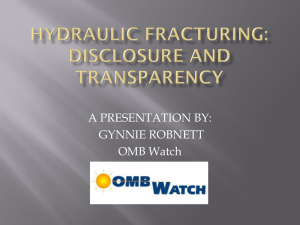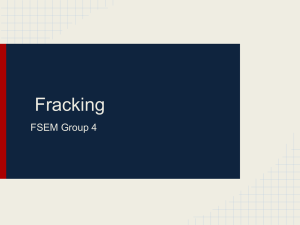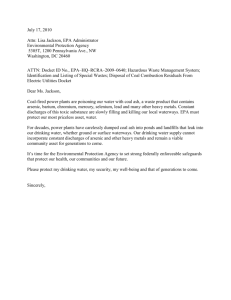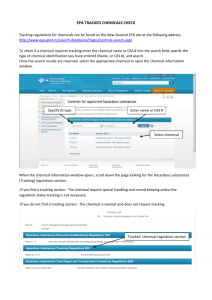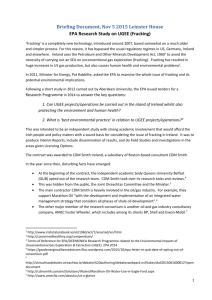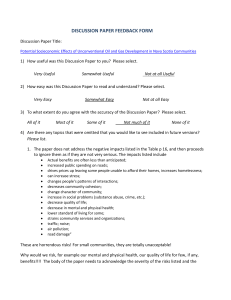STFA lobby asks - Stop the Frack Attack
advertisement
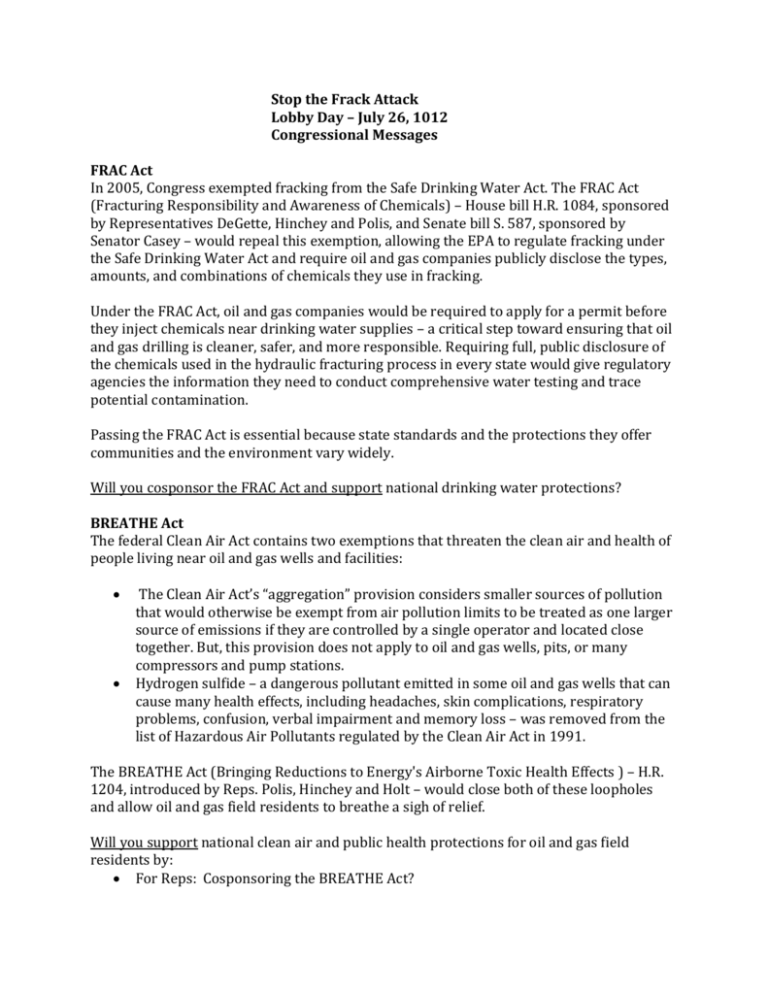
Stop the Frack Attack Lobby Day – July 26, 1012 Congressional Messages FRAC Act In 2005, Congress exempted fracking from the Safe Drinking Water Act. The FRAC Act (Fracturing Responsibility and Awareness of Chemicals) – House bill H.R. 1084, sponsored by Representatives DeGette, Hinchey and Polis, and Senate bill S. 587, sponsored by Senator Casey – would repeal this exemption, allowing the EPA to regulate fracking under the Safe Drinking Water Act and require oil and gas companies publicly disclose the types, amounts, and combinations of chemicals they use in fracking. Under the FRAC Act, oil and gas companies would be required to apply for a permit before they inject chemicals near drinking water supplies – a critical step toward ensuring that oil and gas drilling is cleaner, safer, and more responsible. Requiring full, public disclosure of the chemicals used in the hydraulic fracturing process in every state would give regulatory agencies the information they need to conduct comprehensive water testing and trace potential contamination. Passing the FRAC Act is essential because state standards and the protections they offer communities and the environment vary widely. Will you cosponsor the FRAC Act and support national drinking water protections? BREATHE Act The federal Clean Air Act contains two exemptions that threaten the clean air and health of people living near oil and gas wells and facilities: The Clean Air Act’s “aggregation” provision considers smaller sources of pollution that would otherwise be exempt from air pollution limits to be treated as one larger source of emissions if they are controlled by a single operator and located close together. But, this provision does not apply to oil and gas wells, pits, or many compressors and pump stations. Hydrogen sulfide – a dangerous pollutant emitted in some oil and gas wells that can cause many health effects, including headaches, skin complications, respiratory problems, confusion, verbal impairment and memory loss – was removed from the list of Hazardous Air Pollutants regulated by the Clean Air Act in 1991. The BREATHE Act (Bringing Reductions to Energy's Airborne Toxic Health Effects ) – H.R. 1204, introduced by Reps. Polis, Hinchey and Holt – would close both of these loopholes and allow oil and gas field residents to breathe a sigh of relief. Will you support national clean air and public health protections for oil and gas field residents by: For Reps: Cosponsoring the BREATHE Act? For Sens: Introducing a Senate version of the BREATHE Act? Diesel Fracking Guidance In 2005, Congress exempted fracking from the Safe Drinking Water Act, “… except when diesel fuel is used.” At the time, industry representatives claimed that diesel was no longer used in hydraulic fracturing operations, but a 2011 investigation by members of the U.S. House of Representatives found that over 30 million gallons of diesel were used in fracking between 2005 and 2009. Injecting diesel underground is problematic because it contains toxic chemicals that are linked to cancer, kidney and liver problems and nervous system damage – especially benzene, tolulene, ethylbenzene and xylene. Earlier this year, the EPA issued a draft guidance document to clarify what operators need to do to comply with the law. Will you support EPA’s guidance, as well as further steps to: Ban the use of diesel in hydraulic fracturing. Concern about diesel use in this method of gas extraction is warranted. Initiate formal rulemaking, in order to give the protections the full force of the law. Broadly define diesel to include similar substances like petroleum distillates and BTEX-containing compounds in order to most fully prevent contamination of drinking water from these hazardous chemicals. EPA Study Recent advances in drilling technologies have made access to vast reserves of natural gas and oil economically possible in the US. As a result, the frequency of HF has increased in some regions, and it occurs in a wider variety of geographic regions and geologic formations. These changes have led to an increased public awareness of the potential for HF activities to impact drinking water resources. In 2010, the US Congress recognized a growing public concern about drinking water in areas with HF activity. Since there was a lack of scientific information to verify or reject this concern, Congress requested that EPA conduct a scientifically rigorous, peer-reviewed study to examine the potential for HF to impact drinking water resources. Will you support the efforts of the EPA by opposing efforts to defund or limit the scope of the study? Stop the Frack Attack Lobby Day July 26, 1012 Lobby team (all names) __________________________________________________________ Congressional office _____________________________________________________________ Who you met with ______________________________________________________________ FRAC Act: Will you cosponsor the FRAC Act? Ranking: 1 2 (Opposes the bill) 3 4 (Neutral/Unknown) 5 (Will cosponsor) Notes: BREATHE Act: Will you cosponsor the BREATHE Act? Ranking: 1 2 (Opposes the bill) 3 4 (Neutral/Unknown) 5 (Will cosponsor) Notes: Diesel Fracking Guidance: Do you support EPA’s diesel fracking guidance? Ranking: 1 2 (Opposes the bill) 3 4 (Neutral/Unknown) 5 (Will cosponsor) Notes: EPA Study: Will you oppose efforts to limit the scope or defund the EPA Study? Ranking: 1 2 (Opposes the study) Notes: Other: 3 4 (Neutral/Unknown) 5 (Supports the study)
